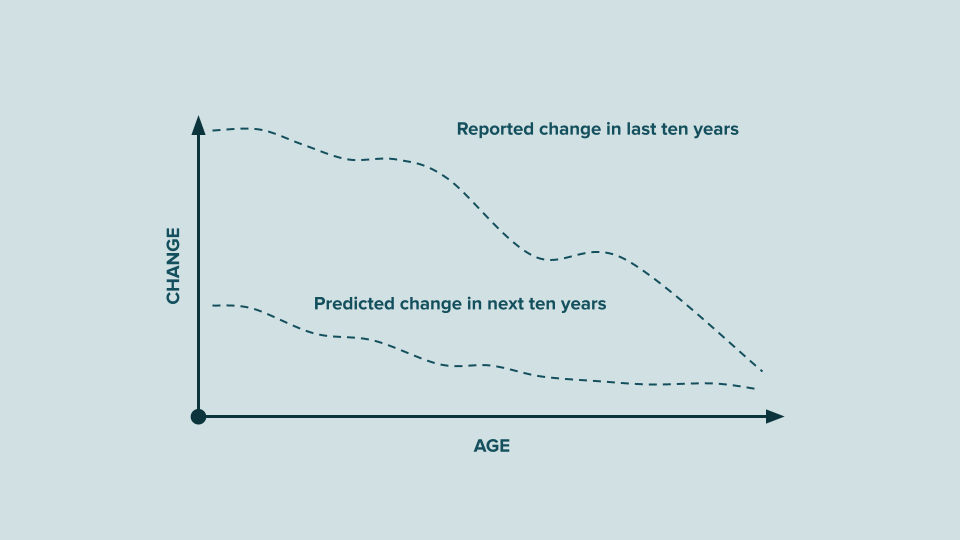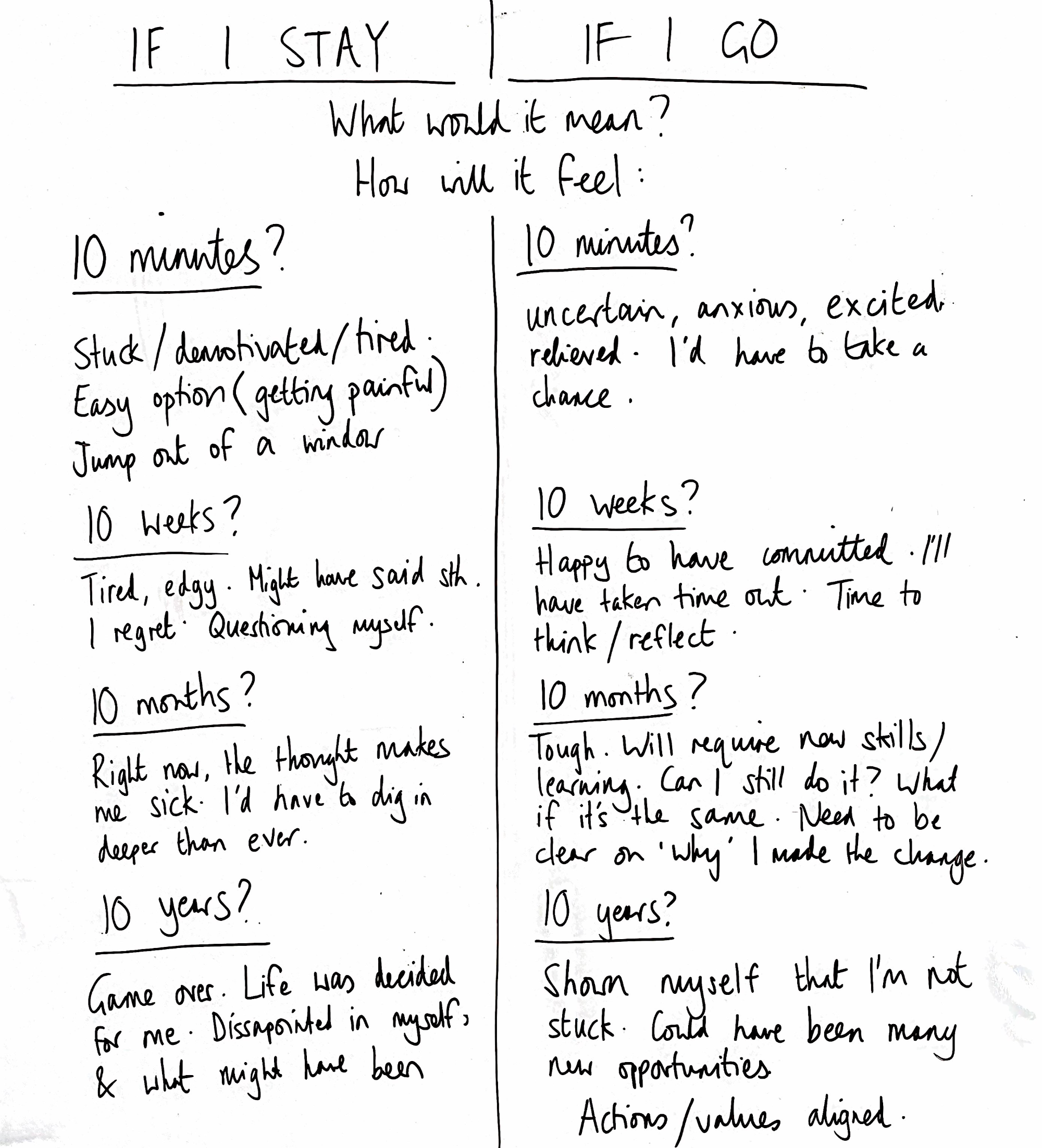Tired of 'Goal-Setting'? Consider This Instead for 2024.

It's back. January. New Year, New Youu ... uck.
Some view the post-Xmas off-ramp as a timely interval to reflect and reset purposes.
Others scoff at fleeting intentions set to fade by February (who needs the torment?)
Then there's the middle ground, where many of us stand – serious about improvement without being militant.
Wherever you land, it never hurts to reassess your beliefs about change and potential for progress.
And, according to some research, many of us foster an odd understanding of our capacity for change.
The End Of History Illusion
The phrase “end of history illusion" refers to a set of studies with a peculiar finding:
Most people underestimate how much they will change in the future despite knowing how much they have changed before now.

In other words, while acknowledging how much you have evolved in the past, you may only expect minor shifts beyond today.
Harbouring little expectation for change is not surprising. You can point to previous experience as tangible evidence of the person you believe yourself to be.
Yet, the future is unknowable and anticipating changes down the line is tricky.
As a result, you may assume past developments have led you to where you are now, and this is how you're set to remain in the future.
In a nutshell, we recognise evolution in the rearview mirror. While we can often point to these prior phases of development, we also tend to assume the story is complete.
That's it - all done. Game over. Just get the head down and knuckle through to Friday, then.
And yet, that's a bit low energy and deterministic. So, beyond shallow affirmations, what can we take from these studies to move ourselves forward?
Whether we like it or not, personal change/progress/ evolution - whatever badge we give it - happens.
With or without your consent, it's happening now. So it's worth a step back to consider what you would like this development to entail - and how you might like to direct it.
Rather than getting tied up in goals, there's a more helpful place to start: Skills.

For instance, many people might set the goal (or task) of finding a more rewarding job or a better, fulfilling relationship.
However, fewer people will pay attention to the specific skills required to bring such desires to fruition. As a result, the likelihood of accomplishment remains less viable.
So, if you want to improve your prospects in any endeavour, attempt to be specific about the learning required to make what you want plausible.
Instead of: 'Who do I want to be?' begin with, 'What do I need to be doing?'
i.e., How can you apply yourself to develop the skills you need?
These two further questions will aid your thinking:
1. What is it you want to experience? Keep asking this question until you get to the core of your hopes. If you do, you'll have to address the underlying beliefs, doubts, fears, and motivations that fuel your desires. Next, ...
2. What skills (practical and emotional) are you prepared to learn to help make this happen?
And, because life happens, you need to anticipate …
3. What might prevent you from developing your skills - and how will you respond should this happen?
If nothing pops to mind, here's something: Ambivalence.
Sly, mendacious and low-energy - ambivalence is set to hamper your decision-making faculties.
Let's take a closer look ...
Way 2 # A theme for reflection: Ambivalence
Understanding ourselves (and other people) requires a toolkit of competencies.
Here are two:
- Identifying the themes (recurring patterns) that emerge in life and ...
- Asking better questions.
As humans, we get seduced by life's plot (twists and turns/ins-and-outs of daily adventure). As a result, we tend to lose sight of what matters.
Instead - to purposefully reflect on your direction -aim to identify the themes that emerge in your life.
You can think of these themes as habits or contours that characterise and shape the landscape and experience of your life.
A theme common to many is ambivalence.
Ambivalence: The state of having mixed feelings or contradictory ideas about something or someone.

The state of ambivalence is a surefire ticket to analysis paralysis - and decision fatigue. Ambivalence invites drowning in the pros and cons of a situation - giving rise to inertia.
Here are some typical scenarios:
Career Changes: You might want a better job but fear losing stability.
Relationships: You're torn between valuing companionship and fearing loss of independence.
Health Choices: You want to quit smoking but enjoy the immediate gratification.
Education: You aim for higher education but worry about the fallout from costs and potential failure.
Parenting: You're caught between the joy of having kids and the required lifestyle changes.
Social Interactions: You want to voice your thoughts in a group but fear judgment.
Financial Decisions: You need a home or car but are anxious about financial commitments.
Retirement: You're excited about freedom but concerned about financial security and purpose.
Essentially, 'Well, if I do this, I will lose that. But if I do that, I'll miss this.'
Yet, in reality, the only loss is in the constant struggle of 'Should I or shouldn't I?'
Wavering represents a cumulative cost to time, focus, and energy otherwise better spent.
A typical tale:
In truth, Jon knew it was time to move on and find a role more aligned with his temperament. Yet, caught in a cascade of what-ifs, he wavered and delayed. He finally left the job, but not before the doctor had signed him off with stress. Jon had wasted time and suffered the consequences as a result.
To combat ambivalence, you must get clear on the potential consequences of procrastination.
- What advantages might you miss by not making a decision?
- What are the potential repercussions of not deciding?
- What if there was no wrong decision?
Painting the picture of one option in detail, including the pros and cons, is also helpful.
If you like pen and paper, here's a handy aid to help get your ambivalence-busting decision-detection juices flowing.
Way # 3: A practical skill to help you along - The Power of Ten
As a quick tool to broaden and organise the scope of your thinking, The Power Of Ten is a decent antidote to ambivalence.
If you find yourself snagged between choices and getting lost in the pros and cons of a situation, do this:
1. Grab a whiteboard/ piece of paper
2. Create two columns - one for both options
3. Next, you'll want four rows - ten minutes, ten weeks, ten months, ten years.
For each option and timeframe, answer this: What will it mean to me (and how would it feel) should I pursue this option?

For instance, should I take the new role or stay put (for now)?
What would these options mean to you (and how would it feel) in ten minutes, ten weeks, ten months and ten years?
Of course, the exercise requires some conjecture. You can't know for sure how you'd feel. But if one of those possibilities gets you more excited than the other, this response says something - and it's your task to reflect upon what this is.
If you carry this out thoroughly and honestly, you're well-positioned to clarify what motivates you - and what might be pulling you down.
Remember, motivation is an appetite. It's hard to force someone to eat if they aren't hungry.
Likewise, nobody else can motivate you. Motivation is a precious (and irreplaceable) asset, so treat it carefully and acknowledge its role in informing your judgement and moving you forward.
Thank you for being here. If you enjoyed this article, subscribe to the Anxiety Master community blog for more.